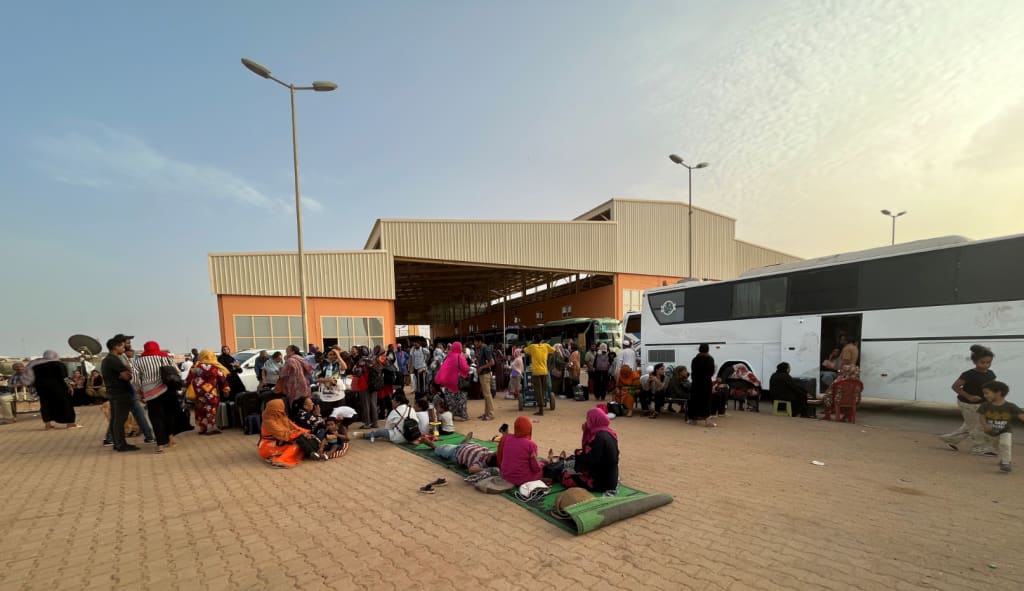No one wants to leave their home, but what can we do?
Sudan's 30 day war

In the early hours of April 15, Sudanese citizens in Khartoum woke up to gunfire. With no understanding or explanation beyond "armed clashes between the Sudanese Armed Forces and Rapid Support Forces", ensuring security became an urgent struggle.
For "Talia" (name changed for safety reasons), her planned Ramadan homecoming party ended in the worst possible way.
"I haven't been to Sudan for five years and I haven't seen my family. During the first two days [of the fight] I couldn't get close to my sons, who were visiting their cousins two streets away, but There was no way to get close to them without getting shot. Every time we crawled to the floor for shelter, I thought about my two sons and how they felt hearing those voices away from their mother."
Shortly after, much of the city was without power or water, and within hours the conflict escalated to jet fighters swarming the skies, heavy gunfire and the sound of artillery leaving civilians trapped indoors without adequate food, water and food. electricity, medicine.
After ten days of uninterrupted conflict, Talia and her family, like many others in the country, have made the difficult decision to leave everything behind and head to Egypt.
"Nobody wants to leave their home, but what can we do? Every day we wake up to the news that a nearby house or building has been bombed, what else can we do?"
It was heartbreaking to leave the home her grandfather, an architect, built over 60 years ago.
"My mom got married at home. So did all my aunts, and so did my brothers and sisters. We have a lot of memories there. It's all we know, all my aunts, uncles, cousins—we They've all lived in it at some point in their lives. Never been empty, and this is the first time."
Thirty days have passed and there is no sign of the war ending. The conflict has spread to Darfur, Northern Kordofan and Blue Nile states - states already weakened by years of devastating conflict and economic instability. Despite the announcement of multiple ceasefires, fighting has continued between the warring sides, leading to rising casualties, displacement and death tolls. At least 604 people were killed and 5,100 injured.
According to the UN refugee agency, an estimated 334,000 people have been internally displaced and more than 100,000 have fled to neighboring countries.
Neighboring countries are deeply feeling the effects of the conflict. Sudan shares borders with Libya, Egypt, Chad, Central African Republic, South Sudan, Ethiopia and Eritrea. Some countries, such as Egypt, have announced the opening of their borders.
Egypt's foreign ministry said 73,684 people had crossed into Egypt, including 68,698 Sudanese and 4,986 third-country nationals.
To travel to Egypt, Thalia's family had to contend with skyrocketing bus fares and a shortage of buses and fuel.
"From the first day of the war, the ticket price has increased more than ten times. Even at this price, it is difficult to find a seat. There are almost 30 of us, and we cannot leave anyone behind."
The Sudanese people are experiencing the worst humanitarian crisis in decades. The conflict has resulted in mass displacement, which is expected to increase.
Together with other UN agencies, UNDP teams and partners continue to support the restoration of critical basic services, critical healthcare, energy and water.
The need for water, food and medical services at the border is increasing every day. The United Nations is working with countries to help more people cross borders.
For Thalia's family, the decision to leave came after a 32-hour wait at the border between Sudan and Egypt. However, her family considers themselves lucky because not only did they succeed, but they did so faster than others.
"I'm terrified that one of us won't be able to leave the border. We have young children and sick old people around us. I've lost count of how many women have passed out in front of me. It's terrible at the border."
The fragile situation in the region continues to deteriorate, with essential services affected in many areas and government institutions as well as humanitarian and development agencies unable to function due to damage caused by conflict and mass looting.
Recovery and reconstruction must begin as soon as possible. The only way out is to stop the war and bring peace to Sudan and its people.





Comments
There are no comments for this story
Be the first to respond and start the conversation.